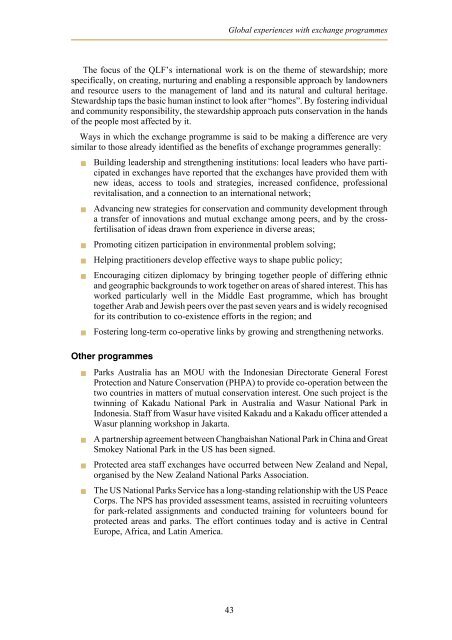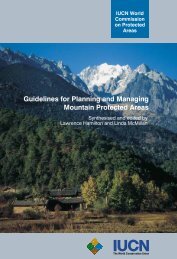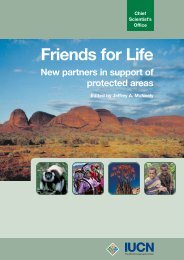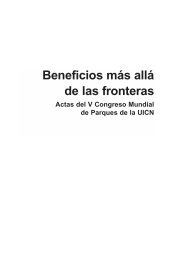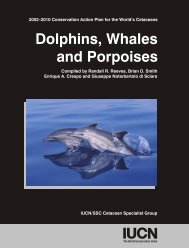Exchange programmes - IUCN
Exchange programmes - IUCN
Exchange programmes - IUCN
Create successful ePaper yourself
Turn your PDF publications into a flip-book with our unique Google optimized e-Paper software.
The focus of the QLF’s international work is on the theme of stewardship; more<br />
specifically, on creating, nurturingand enablinga responsible approach by landowners<br />
and resource users to the management of land and its natural and cultural heritage.<br />
Stewardship taps the basic human instinct to look after “homes”. By fosteringindividual<br />
and community responsibility, the stewardship approach puts conservation in the hands<br />
of the people most affected by it.<br />
Ways in which the exchange programme is said to be making a difference are very<br />
similar to those already identified as the benefits of exchange <strong>programmes</strong> generally:<br />
� Buildingleadership and strengtheninginstitutions: local leaders who have participated<br />
in exchanges have reported that the exchanges have provided them with<br />
new ideas, access to tools and strategies, increased confidence, professional<br />
revitalisation, and a connection to an international network;<br />
� Advancing new strategies for conservation and community development through<br />
a transfer of innovations and mutual exchange among peers, and by the crossfertilisation<br />
of ideas drawn from experience in diverse areas;<br />
� Promotingcitizen participation in environmental problem solving;<br />
� Helpingpractitioners develop effective ways to shape public policy;<br />
� Encouraging citizen diplomacy by bringing together people of differing ethnic<br />
and geographic backgrounds to work together on areas of shared interest. This has<br />
worked particularly well in the Middle East programme, which has brought<br />
together Arab and Jewish peers over the past seven years and is widely recognised<br />
for its contribution to co-existence efforts in the region; and<br />
� Fostering long-term co-operative links by growing and strengthening networks.<br />
Other <strong>programmes</strong><br />
Global experiences with exchange <strong>programmes</strong><br />
� Parks Australia has an MOU with the Indonesian Directorate General Forest<br />
Protection and Nature Conservation (PHPA) to provide co-operation between the<br />
two countries in matters of mutual conservation interest. One such project is the<br />
twinningof Kakadu National Park in Australia and Wasur National Park in<br />
Indonesia. Staff from Wasur have visited Kakadu and a Kakadu officer attended a<br />
Wasur planningworkshop in Jakarta.<br />
� A partnership agreement between Changbaishan National Park in China and Great<br />
Smokey National Park in the US has been signed.<br />
� Protected area staff exchanges have occurred between New Zealand and Nepal,<br />
organised by the New Zealand National Parks Association.<br />
� The US National Parks Service has a long-standing relationship with the US Peace<br />
Corps. The NPS has provided assessment teams, assisted in recruitingvolunteers<br />
for park-related assignments and conducted training for volunteers bound for<br />
protected areas and parks. The effort continues today and is active in Central<br />
Europe, Africa, and Latin America.<br />
43


